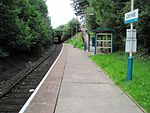Llanddoged

Llanddoged is a small village which lies in the hills a little over a mile to the north of Llanrwst, in Conwy county borough, Wales. The village itself has a small population, with a surrounding rural farming community. Most of the population are Welsh speakers. Llanddoged shares its community council with the rural community of Maenan. Llanddoged has two small hamlets attached to it - Groesffordd and Tan-Lan. Groesffordd has a motor repair garage known as 'Garej Groesffordd'. Tan-lan was known for its notorious bends on the A470 where, before road improvements, many road traffic collisions had occurred. Tan-lan is also home to an Environment Agency Wales depot.
Excerpt from the Wikipedia article Llanddoged (License: CC BY-SA 3.0, Authors, Images).Llanddoged
Ffordd Tyrpeg Uchaf,
Geographical coordinates (GPS) Address Nearby Places Show on map
Geographical coordinates (GPS)
| Latitude | Longitude |
|---|---|
| N 53.157 ° | E -3.787 ° |
Address
Ffordd Tyrpeg Uchaf
Ffordd Tyrpeg Uchaf
LL26 0AZ , Llanddoged and Maenan
Wales, United Kingdom
Open on Google Maps







